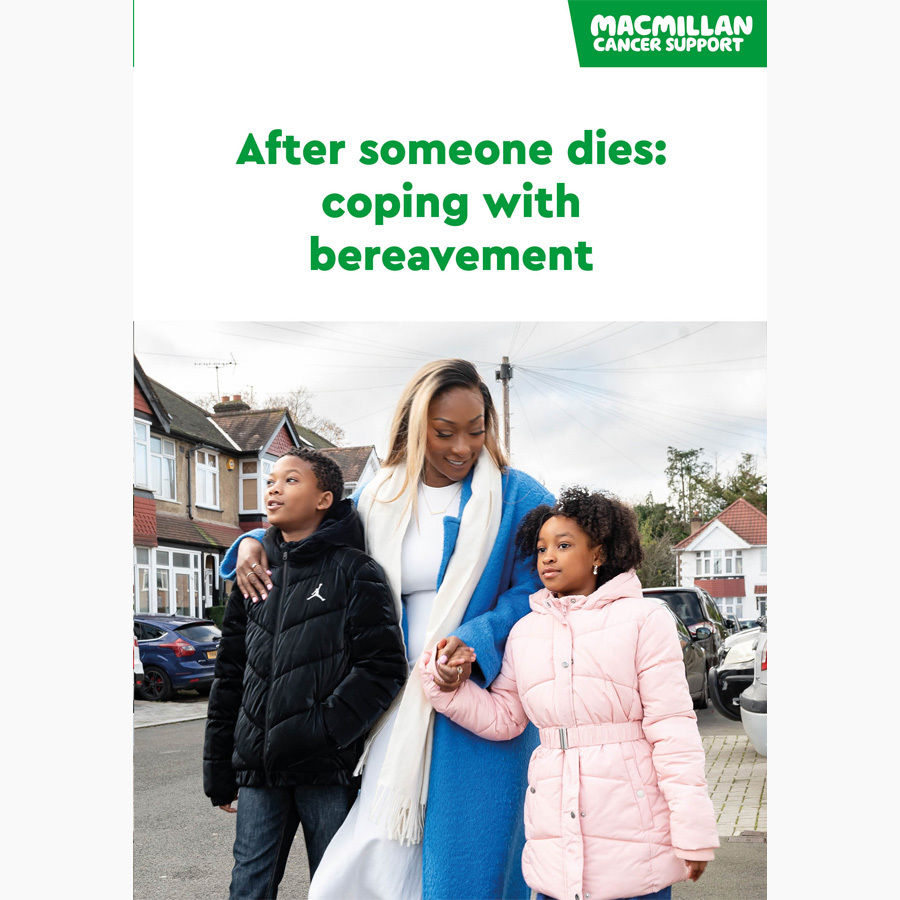Coping with bereavement
Grief affects people in different ways. Life may not feel the same, but many people eventually begin to cope and adapt. You can find ways to help you remember the person who died.
Starting to move forward with grief
You may continue to have days when you feel overcome by grief. But as time goes on, most people find they start to have times when their feelings are less intense. They may be able to begin to look to the future. Life will not be the same again after the death of your relative or friend. But you can start to enjoy life in different ways.
As time passes, most people are able to remember their relative or friend and talk about them without being overcome by their feelings. They start to enjoy things again, feel more comfortable at work and feel able to join in different activities.
Things might continue to be difficult at times, and you may sometimes feel very emotional again. This is normal, but it tends to happen less as time goes on.
Growing around grief
A grief counsellor called Dr Lois Tonkin created a model to show how grief may affect people.
Tonkin’s model of grief
In the past, people had thought that grief gets smaller over time (top row).
This model helps to show that for many people the grief stays the same size (bottom row). At the beginning, it feels as though the grief fills up their whole life and all their thoughts and feelings. But over time, their life begins to grow with and around the grief.
Eventually, the grief is less overwhelming and they find gradually there is a little room for other things in their life.
Returning to work
Deciding when to return to work will be different for each person. Some people feel able to carry on working and take very little time off, while others need longer. Sometimes people who return to work quickly find they need to take some time off later on. Some people may have to go back to work as they do not get paid if they are not working.
Tell your employer how you are coping and talk to them about the best way for you to return to work. You may find it easier to work from home or work part-time for a while, if possible. Some people can find work a bit of a distraction, or a break from their grief.
It can also be helpful to talk to your employer about telling the people you work with. You can tell your employer whether you are happy for them to contact you while you are off.
There are many organisations that can support you at this time. Some workplaces have employee assistance programmes that may offer support. You can ask your employer if there is any type of support available through your work.
Social events
Social events can be very difficult after the death of your relative or friend. It can be hard if it is your partner who has died and you are not used to going to events on your own.
Going out with family or friends can also bring back memories of times when your relative or friend was with you. This can be upsetting.
You may find it helpful to start by going to social events for an hour or 2, instead of staying for the whole thing. You could also ask if you can take a relative or close friend with you. People will want to help you, so it is okay to ask for support.
Some people find it helpful to join a support group. Other people join a club, volunteer or start a new hobby.
Booklets and resources
Getting support for grief and bereavement
The most important thing to remember about grief is that it affects everyone in different ways. We have more information about ways you can get support with your grief. There are charities and organisations who can help you cope:
- Call the Macmillan Support Line for free on 0808 808 00 00, 7 days a week 8am - 8pm.
- Visit the Cruse Bereavement Care website for information and support.
- Contact the Sue Ryder online bereavement support.
- Child Bereavement UK runs support groups and has an app for people aged 11 to 25.
- The Loss Foundation provides support to people who have lost someone to cancer. It offers support both online and in-person, and has information on its website.
- Visit the bereaved family and friends or the bereaved spouses and partners forum in Macmillan's online community.
Remembering someone who has died
When someone dies, you may wish to think of different ways to remember them.
Special dates and memories
You may find anniversaries, birthdays and special occasions very difficult after the death of your relative or friend. They may be particularly difficult during the first year. People describe starting to feel better and then feeling shocked about the strength of their emotions again.
With time, these feelings will usually get less intense. Some people find it helpful to do something special to mark an anniversary or birthday. Or they make time at a celebration to remember their relative or friend.
For example, you could:
- sit quietly in a place that has special memories for you
- share memories and stories at a family celebration
- post on a memorial page on a social media site
- organise an event in memory of your relative or friend.
Something simple and unexpected, like a song or a smell, might remind you of the person who has died. This can cause sudden and overwhelming feelings. In time, you can learn to cope with them
Social media and memorialised accounts
Your relative or friend may have had a Facebook or other social media account. When someone dies, it is possible to convert some of these accounts into memorialised accounts. This allows you and other family members and friends to share memories. You can get information about these accounts from most social media websites.
You can also create a new group on a social media site, where you and other people can share memories of your relative or friend.
You can find information online about closing or deactivating accounts or making memorialised accounts on social media. The Digital Legacy Association has more information.
About our information
This information has been written, revised and edited by Macmillan Cancer Support’s Cancer Information Development team. It has been reviewed by expert medical and health professionals and people living with cancer.
-
ReferencesBelow is a sample of the sources used in our information. If you would like more information about the sources we use, please contact us at informationproductionteam@macmillan.org.uk
Pearce C, Wong G, Kuhn I, and Barclay S. Supporting bereavement and complicated grief in primary care: a realistic review. BJGP Open. 2021; 5, 3. Available from https://bjgpopen.org/content/5/3/BJGPO.2021.0008 [accessed Feb 2023].
GOV.UK. What to do when someone dies: step by step. Available from www.gov.uk [accessed Feb 2023].
GOV.UK. Guidance for doctors completing medical certificate of cause of death in England and Wales. 2022. Available from www.gov.uk [accessed Feb 2023].
National Records of Scotland. Registration of deaths and still-births. Available from www.nrscotland.gov.uk [accessed April 2023].
Date reviewed

Our cancer information meets the PIF TICK quality mark.
This means it is easy to use, up-to-date and based on the latest evidence. Learn more about how we produce our information.
The language we use
We want everyone affected by cancer to feel our information is written for them.
We want our information to be as clear as possible. To do this, we try to:
- use plain English
- explain medical words
- use short sentences
- use illustrations to explain text
- structure the information clearly
- make sure important points are clear.
We use gender-inclusive language and talk to our readers as ‘you’ so that everyone feels included. Where clinically necessary we use the terms ‘men’ and ‘women’ or ‘male’ and ‘female’. For example, we do so when talking about parts of the body or mentioning statistics or research about who is affected.
You can read more about how we produce our information here.






